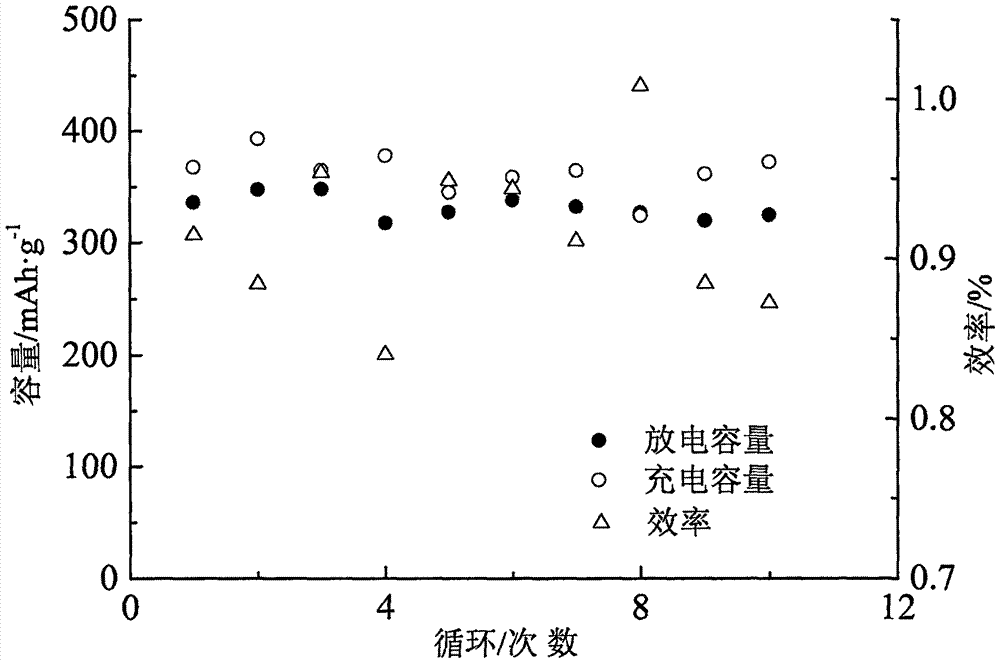Potassium ion battery negative electrode material KNaNb0.8Co0.1Ag0.1TiO6 and preparation method thereof
A battery anode and potassium ion technology, applied in battery electrodes, circuits, electrical components, etc., can solve the problems of slow potassium ion migration, material lattice transformation, electrode material particle breakage, etc. The effect of electrical conductivity and grain boundary resistance reduction
- Summary
- Abstract
- Description
- Claims
- Application Information
AI Technical Summary
Problems solved by technology
Method used
Image
Examples
Embodiment 1
[0023] Embodiment 1: with potassium nitrate, sodium nitrate, silver nitrate, niobium pentoxide, titanium dioxide, cobalt nitrate hexahydrate according to stoichiometric formula KNaNb 0.8 co 0.1 Ag 0.1 TiO 6 Put into a ball mill, the mass ratio of the ball mill and the material is 20:1, and ball mill for 11 hours at a speed of 200 rpm. The ball-milled material is fed into such as figure 1 In the synthesizer shown, the flow velocity of the air is 0.5m 3 min -1 ; The synthesis device consists of four parts: an ultrasonic atomizer, a droplet area, a tube furnace and a cyclone separator; at the same time, start the ultrasonic atomizer and immerse in 1.0mol L -1 An immersion ultrasonic transducer with a power of 250W in potassium nitrate aqueous solution produces a large number of mist droplets and the flow rate is 0.5L min -1 The mixed gas of oxygen and argon with a volume ratio of 20:80 is carried from below to the droplet area; the air carries the ball-milled material throu...
Embodiment 2
[0024] Embodiment 2: with potassium nitrate, sodium nitrate, silver nitrate, niobium pentoxide, titanium dioxide, cobalt nitrate hexahydrate according to stoichiometric formula KNaNb 0.8 co 0.1 Ag 0.1 TiO 6 Put into the ball mill, the mass ratio of the ball mill and the material is 20:1, and ball mill for 19 hours at a speed of 400 rev / min. The ball-milled material is fed into such as figure 1 In the synthesizer shown, the air velocity is 3.5m 3 min -1 ; The synthesis device consists of four parts: ultrasonic atomizer, drop zone, tube furnace and cyclone separator; at the same time, start the ultrasonic atomizer and immerse in 1.5mol L -1 An immersed ultrasonic transducer with a power of 250W in potassium nitrate aqueous solution produces a large number of mist droplets and the flow rate is 3.5L min -1 The mixed gas of oxygen and argon with a volume ratio of 20:80 is carried from below to the droplet area; the air carries the ball-milled material through the droplet area...
Embodiment 3
[0025] Embodiment 3: with potassium nitrate, sodium nitrate, silver nitrate, niobium pentoxide, titanium dioxide, cobalt nitrate hexahydrate according to stoichiometric formula KNaNb 0.8 co 0.1 Ag 0.1 TiO 6 Put into ball mill, the mass ratio of ball mill and material is 20: 1, with the speed ball mill of 300 rev / mins 15 hours. The material after ball milling is sent into such as figure 1 In the synthetic device shown, the flow rate of nitrogen is 3.0m 3 min -1 ; The synthesis device consists of four parts: an ultrasonic atomizer, a droplet area, a tube furnace and a cyclone separator; at the same time, start the ultrasonic atomizer and immerse in 1.2mol L -1 An immersion ultrasonic transducer with a power of 250W in potassium nitrate aqueous solution produces a large number of droplets and the flow rate is 2.5L min -1 The mixed gas of oxygen and argon with a volume ratio of 20:80 is carried from below to the droplet area; nitrogen carries the ball-milled material through...
PUM
 Login to View More
Login to View More Abstract
Description
Claims
Application Information
 Login to View More
Login to View More - R&D
- Intellectual Property
- Life Sciences
- Materials
- Tech Scout
- Unparalleled Data Quality
- Higher Quality Content
- 60% Fewer Hallucinations
Browse by: Latest US Patents, China's latest patents, Technical Efficacy Thesaurus, Application Domain, Technology Topic, Popular Technical Reports.
© 2025 PatSnap. All rights reserved.Legal|Privacy policy|Modern Slavery Act Transparency Statement|Sitemap|About US| Contact US: help@patsnap.com


